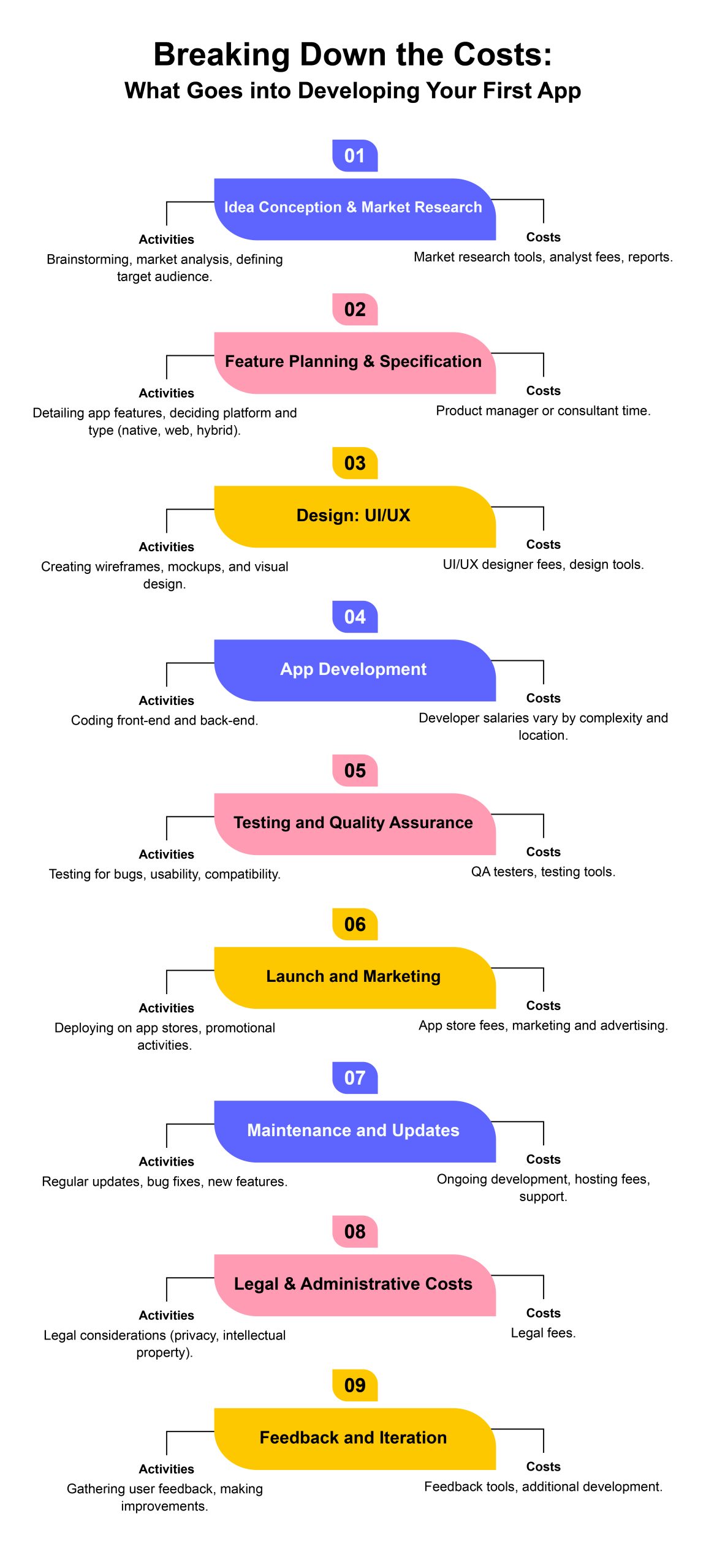Let's Get You Started

Let's Get You Started




Welcome to the world where ideas meet execution, and dreams become downloadable realities. If you’re on the cusp of venturing into the app development realm, this is your go-to guide. We’re not just talking about figures and stats; we’re diving deep into the world of app development startup costs. Buckle up, as we unravel the mystery behind the numbers and what they really mean for you and your entrepreneurial journey.
Before we dive into the nitty-gritty, let’s set the stage with some basic understanding. App development isn’t just about coding; it’s a blend of innovation, strategy, design, and, of course, technical prowess. The app development startup costs can be as diverse as the apps themselves. From a simple utility app to a complex social media platform, the range is wide and varied.
Here’s where we get down to brass tacks. Let’s break down the app development startup costs associated with each stage of development.

In the exciting journey of app development, a critical yet often overlooked aspect is the monetization strategy. It’s not just about creating an app; it’s about ensuring it can be a sustainable and profitable venture. Understanding and implementing the right monetization strategy is as crucial as the development process itself. Let’s dive into the world of app monetization and explore how it can shape your app’s financial success.
The monetization model you choose should align with your app’s purpose, target audience, and market trends. Here are some popular models:
Your chosen monetization model can significantly impact both your development budget and revenue projections. For instance, developing an app with sophisticated in-app purchase systems may require a larger initial investment. On the other hand, an ad-based model might have lower upfront costs but requires a strategy to drive high user engagement and retention to be profitable.
Balancing monetization with user experience is critical. An overly aggressive monetization strategy can lead to user dissatisfaction and high churn rates. The goal is to create a monetization strategy that feels integral to the app experience, rather than an interruption or hindrance.
Understanding your audience and market is key to choosing an effective monetization strategy. Conduct thorough market research to understand your users’ willingness to pay and their preferences. Also, be prepared to adapt your strategy based on user feedback and market trends. What works today may not work tomorrow, and flexibility is crucial.
Consider the long-term sustainability of your monetization strategy. Is it scalable? Does it align with your app’s growth plan? A sustainable monetization model not only supports current operational costs but also fuels future development and growth.
Be mindful of legal and ethical considerations, especially regarding data privacy and advertising regulations. Transparency with users about how you monetize their data or content consumption is crucial in building trust and loyalty.
| Development Stage | Estimated Cost Range ($) |
| Concept & Research | 1,000 – 5,000 |
| Design & UX | 5,000 – 20,000 |
| Technical Development | 10,000 – 50,000 |
| Testing & Launch | 3,000 – 10,000 |
| Maintenance & Marketing | 2,000 – 10,000 monthly |
Developing the app is just one part of the story. There’s more to consider:
App development is an exciting yet challenging journey. Balancing creativity, technical requirements, and budget constraints is the key to bringing your app from concept to reality.
As we look ahead, the app development landscape continues to evolve at a rapid pace. Staying abreast of future trends is crucial for developers and entrepreneurs alike. These trends not only shape how we develop apps but also how we interact with technology in our daily lives. Let’s explore some of the most promising and exciting trends in app development that are set to define the future of this dynamic industry.
AR and VR technologies are transforming app experiences, offering immersive and interactive environments. From retail to education, these technologies are creating new possibilities for user engagement. AR, in particular, has found a significant place in mobile app development, enhancing real-world experiences with digital overlays. As hardware becomes more accessible, expect to see a surge in AR/VR apps.
AI and ML are not just buzzwords; they are revolutionizing app functionality. From personalized user experiences to predictive analytics, these technologies enable apps to become smarter and more intuitive. AI can automate complex processes, offer personalized content, and even drive decision-making in business apps. Machine learning, with its ability to learn from data, is making apps more adaptive and responsive to user behavior.
The IoT is connecting everyday devices to the internet, and apps are the bridge facilitating this connection. Home automation, health monitoring, and smart city applications are just a few areas where IoT-integrated apps are making a significant impact. The future will see apps becoming a central control point for a multitude of connected devices.
The rollout of 5G will be a game-changer for app development. With its faster speeds and lower latency, 5G will enable more complex and powerful apps, particularly in areas like streaming, gaming, and AR/VR. It will also facilitate the growth of IoT and AI applications, making them more efficient and effective.
The rise of mobile commerce and FinTech apps is reshaping how we manage and spend money. From contactless payments to personalized banking, these apps are becoming more secure, user-friendly, and feature-rich. As digital currencies and blockchain technology evolve, expect to see further innovation in this space.
As apps become more integral to our personal and professional lives, security is paramount. Developers will need to place a stronger emphasis on data protection, privacy regulations, and secure transactions. This trend will lead to the integration of advanced security features, like biometrics and end-to-end encryption, becoming standard in app development.
There is a growing trend towards developing apps that support sustainability and social responsibility. Apps focusing on environmental impact, mental health, and social issues are gaining popularity. This trend reflects a broader shift in consumer consciousness and the role technology can play in driving positive societal change.
Voice technology and conversational user interfaces are making apps more accessible and intuitive. The integration of voice assistants like Siri, Alexa, and Google Assistant is becoming commonplace. Future apps may move beyond touchscreens, offering voice and conversation-based interactions as primary interfaces.
What’s the minimum budget I should plan for a basic app?
Expect to budget at least $10,000 for a basic app.
Around what amount of time does it normally take to create an app?
Development time can range from 3 months to over a year, depending on complexity.
Should I develop for iOS, Android, or both?
This depends on your target audience. Research which platform they use more.
How can I reduce my app development startup costs?
Focus on essential features first and consider cross-platform development tools.
Is post-launch marketing essential?
Absolutely. Even the best app needs a push to get noticed in a crowded market.

Welcome to Appxide, where innovation meets utility in the world of app development. Our mission is to craft cutting-edge digital solutions that simplify lives and spark connections. With a diverse portfolio that traverses multiple sectors, we are committed to excellence and user-centric design. Stay tuned to our blog for the latest in tech, insights, and the stories behind our projects. Dive into the future with us – where every app we create is a step towards the extraordinary.